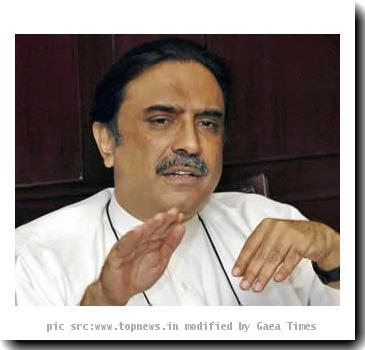Clinton wants Afghanistan and Pakistan to work together against al-Qaida and Taliban militants
By Matthew Lee, APSunday, July 18, 2010
Clinton wants more Pakistan-Afghan cooperation
ISLAMABAD — U.S. Secretary of State Hillary Rodham Clinton is pushing Pakistan and Afghanistan to work together against al-Qaida and the Taliban as she tries to refine the goals of the war in Afghanistan.
She kicked off a South Asia trip Sunday with meetings in Pakistan’s capital, appealing for cooperation between the neighboring nations on the nearly 9-year-old war and bringing new U.S. aid for Pakistan, where anti-American sentiment is high.
In talks with President Asif Ali Zardari and Prime Minister Yusuf Raza Gilani, ahead of Monday meetings with military and civilian officials, Clinton was conveying the message that the U.S. is committed to the country’s long-term development needs, not just short-term security gains.
The U.S. wants more help from Pakistan in taking on Pakistan-based militants who are accused of conspiring to attack the United States, including the failed Times Square bombing, and stepping up action against extremists along the Afghan border.
“To get there we need to change the core of the relationship with Pakistan,” said Richard Holbrooke, the special U.S. special representative for Afghanistan and Pakistan.
Clinton was offering a package of about $500 million in development programs, funded by legislation approved by Congress to triple nonmilitary aid to $1.5 billion a year over five years. The aid will focus on water, energy, agriculture and health. The initiatives mark the second phase of projects begun under a new and enhanced strategic partnership.
Hours after Clinton’s arrival, a suicide bomber ran past guards at a minority Shiite mosque in eastern Pakistan then blew himself up, wounding several worshippers. The attack, hundreds of miles away from Islamabad, appeared to be the latest in a string by Sunni extremists against other Muslims they consider infidels.
Holbrooke noted that when Clinton visited Pakistan last October she had “waded into continually hostile and skeptical crowds.” But he maintained that the new U.S. focus is “producing a change in Pakistani attitudes, first within the government and gradually, more slowly, within the public.”
Still, he and other officials acknowledge, mistrust of America runs deep in Pakistan, particularly over unmanned drone strikes. They’re aimed at militants but often kill or injury civilians; to many Pakistanis, they represent an unacceptable violation of sovereignty.
Equally important, officials say, is getting Pakistan and Afghanistan on the same page.
Holbrooke said last week that “nothing could be more important to the resolution of the war in Afghanistan than a common understanding between Afghanistan and Pakistan on what their strategic purpose is.”
In a hopeful sign, Clinton witnessed the signing of a trade deal between Afghanistan and Pakistan that will open their borders to more goods. The deal was decades in the works. “This is a vivid demonstration of the two countries coming closer together,” Holbrooke said.
After her stop in Pakistan, Clinton is set to attend an international conference on Afghanistan in Kabul on Tuesday.
Security was tightened in the Afghan capital ahead the conference which will assemble diplomats from 60 nations as well as the heads of NATO and the United Nations. Nonetheless, a suicide bomber killed three civilians near a busy market.
American lawmakers and voters are increasingly questioning the course of the drawn-out war with rising death tolls among U.S. and international troops and growing questions about corruption. Last month was the deadliest of the war for international forces: 103 coalition troops were killed, despite the infusion of tens of thousands of new U.S. troops.
Later in the week, Clinton will meet up with Defense Secretary Robert Gates in South Korea, where tensions with the communist North have risen after the sinking of a South Korean warship that was blamed on the North.
She will finish her trip in Vietnam for discussions with regional leaders. Among the topics will be the upcoming elections in Myanmar.
Online:
Preview of Clinton’s trip: tinyurl.com/36pjb7r
Tags: Afghanistan, Asia, Asif Ali Zardari, Central Asia, Clinton-asia, Islamabad, North America, Pakistan, South Asia, Terrorism, United States

